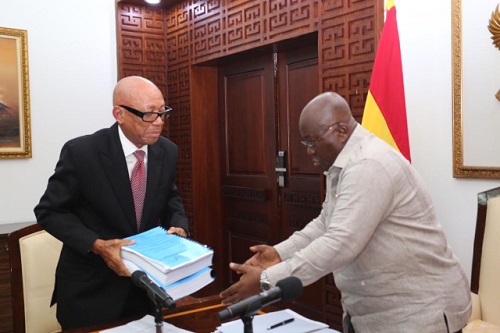The Akufo-Addo government has rejected some of the recommendations of the Emile Short Commission of Inquiry which investigated the Ayawaso West Wuogon by-election violence.
The government in its White Paper said, “the report failed to address the first and most critical of the terms of reference of the commission.â€
“The failure to do so disables government from accepting in whole the findings of the commission,†the White Paper said.
The commission was among other things mandated “to make a full, faithful and impartial inquiry into the circumstances of, and establish the facts leading to the events and associated violence that occurred during the Aysawaso West Wuogon by-election.â€
The Commission took testimonies of principal witnesses in the matter including the Member of Parliament for Ningo Prampram, Sam George; the Commander of the National Security SWAT team, DSP Samuel Azugu; and the then NDC Parliamentary candidate, Delali Kwasi Brempong.
The Commission interviewed over 20 other witnesses and persons of interest over a three-week period.
The hierarchy of national security in Ghana made appearances before the commission over the course of the hearing amid the reports of abuse of power by the National Security Personnel.
Among the recommendations rejected, the government said Mohammed Sulemana, the SWAT officer seen on camera assaulting the Ningo-Prampram MP did not need to be prosecuted, contrary to the opinion of the commission.
The government in the Paper argued that the facts presented by the commission supported “a valid defense of provocation for the said assault [by Mohammed Sulemana].â€
The government disagreed with the commissions finding that “there is a lack of clarity of responsibility and roles as well as lines of reporting.â€
READ ALSO: Ayawaso West violence: Gov't publishes Emile Short Commission report
A number of critics cited the lack of coordination at the top of the security hierarchy as a major failing on the day of the by-election
The level of training of the National Security Personnel was also called into question.
But the government cited the Constitution and the Security and Intelligence Agencies Act, 1996 which “spell out clearly the responsibilities and roles of the various offices within the national security establishment.â€
Double to face probe
The government, however, said one of the persons of interest in the confusion, National Security officer Ernest Akomea, alias Double, must be prosecuted for the unauthorized possession of firearms under subsection (1) of section 192 of the Criminal Offences Act.
He has been referred to the Criminal Investigations Department for further investigations.
READ ALSO: Gov't hasn't shown any willingness to release Ayawaso violence reports - Sam George
In his appearance before the commission, Mr. Akomea, who was on duty at La Bawaleshie notably revealed he was recruited into the country’s National Security Council in 2017 after completing a three-week training programme.
Compensation for victims
The White Paper also revealed that the government was in favour of compensation for persons who were injured in the National Security Operation.
Some National Security Operatives fired gunshots at a polling centre at La Bawaleshie, injuring about six persons believed to be National Democratic Congress supporters during the election on Thursday, January 31, 2019.
Â





